- Home
- Stephen Hunter
Havana Page 15
Havana Read online
Page 15
“Well,” he said.
“Oh, hi, Roge, how are you?”
Frenchy rose—though just a bit slow, Roger thought—and made room, waited for him to sit, then took a seat on the sofa under photos of the marine colonel’s fabulous career stops in Okinawa, Seoul and Panama.
“Fine,” Roger said.
“The match?”
“Fine, fine. So what did you find out?”
It had been Frenchy’s idea to return to the crime scene this morning to look for whatever had to be looked for, to talk with the Cuban security police who handled the “investigation,” such as it was, while Roge played tennis.
“Well, no new physical evidence has been uncovered. The Cubans are pretty sure, though, that they have their man. I did find out who. Oh, this is rich. It’s some gangster named El Colorado. How cowboy-movie is that? I think we’ll see something happening very soon.”
“El Colorado? That does sound Republic Pictures.”
“An ex-socialist. Now a pimp master. He owned the brothel where the congressman acted up. Furthermore, it appears he tried to have Earl killed in prison but was mysteriously thwarted. But these Latin types: you play by their rules or the hammer comes down. I believe the Cubans will hammer the hammer very quickly. Certain messages must be sent.”
“And you got the traffic out?”
“Yes, Roge, last night, after we got in. And I checked for incoming, but there was nothing. I put out another report this morning before I left for the site, in your name, of course. I haven’t told them about impending action against El Colorado. Should I?”
“It might look good if we’re predicting it. You might even tell them we suggested the action.”
“Yes. Yes, that’s good.”
“Short-term, but good.”
“Uh? Meaning?”
“Meaning I am worrying about long-term.”
“Long-term?”
“You see, that’s your flaw, Walter. You’re a good nuts-and-bolts man, I give you that. But you have to see a larger picture, see where it’s all going.”
“I can never seem to remember that.”
“It is this Earl. He said last night he just wanted to go home.”
“Well, Roge, I mean, he’d just been in a gunfight, he’d just gotten shot. Possibly he was a little, you know, down. You know, his pep dipstick was reading a quart low.”
But Roger didn’t see a joke.
“Look, I’m worried that this is not shaping up the way we anticipated. We’ve invested a lot in this man. I want something to happen. This isn’t the Big Noise we wanted to make. This was someone else’s Big Noise and it will upset a lot of people at United Fruit and Domino Sugar and Bacardi and Hershey’s and Curtis. We need to make our Big Noise.”
“Roge, I think it’s going swell. Look, he’s going to be in that hospital another week, he’ll rest up, his morale will improve, his sense of duty become clear again. And when he gets out we can put a full-court press on him. We’ve got this assassination attempt as proof of subversion and guerilla activity. We link it to Castro, we make the case to Earl, and we are all set. It’s in the bag and—”
“Stop it!”
Roger hated emotional outbursts, loss of control, anger, the quiver in the voice, the tremble in the fingers, the dryness in the lips, the secret thump of an agitated heart. He hated all that. But now he could not stop himself.
“I am tired of your con-job answers. You always have an answer. You’re never at a loss for words. You always pretend to know. I’m tired of it. You assist. You make sure that what policies I set, you make certain they happen.”
“Of course, Roge, I merely—”
“You merely were doing your hustle again. I hate it. I’m sick of it. This Earl thing—it’s your hustle. Let me make that clear. We have a responsibility. We have something we have to do and it’s got to be done soon, and with Earl, and it has to be a permanent, total solution to our problem, a successful conclusion to our mission. The Big Noise. Do you get it?”
“Of course, Roger.”
“My next ticket is West Berlin. That is the real action. I need a feather in my cap. Now the question is, are you coming, or do you go onto the Langley scrap heap of failed assistants, of young promising fellows who just didn’t quite work out and ended up in analysis or training or admin? Which is it, Walter? You can come with me, you can stay behind. It’s up to you.”
“Roger, I’ll deliver. Earl will deliver.”
There was an urgent rap at the door.
The two men exchanged looks, then Frenchy rose and opened it, to admit Lt. Dan Benning, in an agitated state.
“You really ought to have a radio on.”
“What’s going on?”
“The Cuban army has attacked a gangster named El Colorado at his house in Centro Havana. Tanks, armored cars, machine guns. There’s a battle going on downtown right now!”
Chapter 24
Speshnev and the young man Castro sat at a sidewalk cafe in Centro, sipping coffee as the tanks rumbled by.
“Pah!” said Speshnev. “These are not tanks. I have seen tanks. In Spain, there were tanks. The German Panzers were huge and carried immense armor and armament. Now those were tanks!”
These tanks were American M4 Shermans, obsolete by a decade and somehow seconded to the Cuban national army for defense of the island against threat of invasion by, er, Haiti. They rumbled down La Rampa before turning onto 23rd, for Vedado, just a block or two away, where the battle still raged.
“It took them long enough to get here,” Speshnev continued in his rant. “Good heavens, your people are so slow. It is the Spanish disease. Siesta, siesta, always the siesta. That is your curse. It’s an abomination.”
The tanks would signify the last phase of the battle. A squad of Batista’s prize assault troops had attempted to broach the house several hours earlier, but withering automatic fire killed half and drove the others back. The house was sprayed with machine gun fire—its noise rattled off the windowpanes all over town—and when whoever was in charge decided enough was enough, that everyone inside was dead, he sent in two squads of asaltos. Half were killed, half driven away.
So then it was wait and snipe, wait and snipe, for hours, until at last the tanks arrived. Now they were here. It would soon be over.
“Isn’t this a little dangerous?” asked Castro. Now and then a ricochet would whine by, loosed by who knew which side and off of how many bounces. Most people were behind cover, but Speshnev insisted on pretending it was a calm summer day. He sat drinking his sweet coffee. The waiter wore a pot on his head and scuttled along the ground like a crab, but continued in his profession, rather heroically.
“No,” said Speshnev, “it is not a little dangerous. It is in fact very dangerous. You can never tell which freakish way a bullet or a chunk of shrapnel or a wave of concussion will bounce. At any moment, we could die. Waiter! Another coffee, please, pronto.”
“Si, señor,” came the meek call from within.
“Then why do we sit here? Is this to test my courage? Are you trying to prove me a coward? I am not a coward, but I see no point in pointless, flamboyant risk for no gain.”
“Well, then, let me explain. All in all, what is happening so close by is an interesting object lesson for a young man who seeks to enter the profession in which you claim such an interest. Far more beneficial for you, I would say, than your awful chess, at which you show no progress and even less aptitude than before.”
“I play Ping-Pong. Do you play Ping-Pong?”
“Of course not,” Speshnev sniffed. “It’s an idiotic game.”
“It’s actually rather fast and exciting and—”
“You are trying to change the subject. Shut that mouth and listen and try and learn. What is the moral of the day?”
“Don’t fight tanks with machine guns?”
“That is the moral of any day. No, this day.”
“I suppose—”
The world ended in noise. The
n it came back again, just as it had been.
It was the sound of a Sherman’s 75mm cannon firing. It seemed to momentarily suck the atmosphere from the planet and all within the cone of its percussion waves flinched, young Castro especially, for the pain seemed to drive two sharp needles into his ears.
“Eeee-gods!” he said.
“Yes,” Speshnev said, “war is loud. Battle is tremendous. It is not for the—”
But another explosion followed, as loud, and then the sense of sitting and talking in a cafe was gone totally, as one shell boomed, then another, in steady succession, ever so painfully loud. The Shermans were firing salvos, the shells detonating in the wreckage of the once beautiful house. Dust and smoke filled the air, and the vibrations from each individual blast seemed to linger and mount as yet more shells were fired. The cannonade went on for a solid three minutes. Castro put his fingers in his ears and his face down on the table to avoid dust. The agent simply sipped his strong sweet coffee, seemingly unperturbed.
At last it was over.
“My mother!” said Castro. “That was something.”
“Yes it was, and back to the subject please.”
“I suppose the lesson is, he struck too soon.”
“Ah,” said Speshnev. “At last you have said one tiny thing that impresses me. Not much, but a little. Yes, too early, no follow up, no alternative plan, no alibi, nothing.”
“Well, he was outsmarted. His men were captured and I would think tortured and they gave him up. What can be done?”
“What can be done is simple: discipline, patience, coolness, cunning. That is the way wars are won, not by flamboyant stunts.”
Machine gun fire. Lots of it. Then individual shots, as, presumably, troops shot at corpses to make certain they stayed corpses.
“You said we would go look.”
“It’s happening faster than I anticipated. Use your ears. This is the radio of failed revolution. He had no need to assassinate the congressman and had he succeeded, the consequences for all ofus—except him—would have been tragic. There are always consequences. Nothing occurs without consequences. You must face consequences.”
“I must be realistic in my thinking, you are saying.”
More machine gun fire. A steady, beating roar, then silence.
“Learn this: you must have discipline. You must not strike until you are strong enough. You must withdraw quickly to avoid being caught. You must bleed them and bleed them and bleed them. It is a question of will. Do you have the will? Colorado did not. He had the means, and that was all, and it got him crushed in the stones of his own house.”
“I see.”
“You were very lucky. You managed to disaffiliate yourself from his plot, and to disconnect yourself from being his pawn. Otherwise you would be in prison now and before the wall tonight. Yet here you sit, drinking coffee.”
“I was lucky to have someone so astute looking after me. I will not be so hasty and foolish in the years to come.”
“I hope not. But I need a promise. You will not do anything stupid or ill-founded, no matter what anger seizes you. Do you understand? If I am to continue, if our sponsorship is to grow, if your movement is to prosper, it has to be well run. You have charisma, but do you have wisdom? The former without the guidance of the latter is pure anarchy. From now on, you must seek approval. If you do that, you’ll be surprised how you can be aided by us.”
“I can tell you are experienced.”
A last rattle of machine gun fire echoed down the dusty streets.
“What is next is, you go on vacation.”
“Vacation! Why, I have work to do. We have a plan already in place, I shouldn’t tell you this, for Santiago, although, yes, it needs some polish—”
“You have no work. Don’t delude yourself. Don’t bore me with fantasy. Forget Santiago. For now, you are too famous. I want you gone. And I do mean gone. You don’t tell your wife, you don’t tell your three mistresses—”
“Four, actually. The new one, so beautiful.”
“—your four mistresses, your three, or is it two, followers. Poof! You are vanished, invisible, as of the moment you leave this cafe.”
“But my wife—”
“—will forgive you, as she always has. I am not joking. There will be something like a terror ahead, and some deaths will be whimsical. With your idiocy, you could walk into that in a second. Some people think you have talent, and must be preserved, and that task, melancholy though it be, has fallen to me. So off you go.”
“Where shall I go?”
“Don’t even tell me. Think of me as a magician. I count three, and when I reach it…you are gone.”
The young man had vanished by two.
Chapter 25
What a wonderful story. Drunken American congressman goes to whorehouse, gropes, squeezes, requests vague perversions, acts up, strikes the girl, causes a ruckus and insults Cuban hostess. His bodyguard roughs up the local security. The hostess complains to the overboss, and in that fiery Latino way, psychotically obsessed with honor and face, he takes it too seriously and decides to teach a lesson to the congressman and by extension all arrogant grasping Americans, with their money, their new buildings, their disdain for Cuban machismo.
Alas something goes tragically wrong; the assassination attempt is foiled, and the heroic Cuban security services, ever fast on their feet and so professionally agile, track the attack back to its source and decide that’s where the lesson must be taught. Thus the military settles the score, though it’s a daylong battle not settled until the tanks arrive late in the afternoon, and scores of the innocent and even some of the guilty die. But finally El Presidente’s flag flies over No. 353 23rd Street in Vedado, and for days the curious, the bloodthirsty, the horrified come look at the smokey ruins where so many died, and where the story ended in a brilliant explosion of bloodlust, ambition, vengeance, crazed bravado and fabulous theater.
But the serious people understand that there is so much more to it than that, and underneath the gossip and the scandal and the delicious details, they begin to investigate. This includes the expat business community, diplomatic and intelligence circles, even the American military. All must know more and all are eventually satisfied. But chief among the ranks of the intensely curious is the unofficial American crime boss of Havana, Mr. L, who receives many urgent calls from compatriots back in America. These august, elderly gentlemen are suddenly worried about the political stability of the island in which they’ve invested so heavily. Mr. L is no fool, and understands that these men need an “inside story,” the true gen, as it were, that conforms to their intuitive sense of conspiracy. He makes calls, he asks favors, he gently twists arms, until something resembling an underplot emerges and though it’s not a thing that could ever be proven in a court, it’s enough to satisfy the various people he must satisfy. This is done over several days with careful deliberation, for such is Mr. L’s way, cautious and painstaking, good with details, ever patient. And of course finally a plan is devised, and like all good plans it not only satisfies its own mandates but also, magically, several others as well. It’s too good an idea, really, not to be implemented.
So Frankie is summoned to the Montmartre from his dank exile, ever ready to please, primed to go the extra yard, incredibly happy to be noticed again.
“You’ve heard it all, I suppose,” said Mr. Lansky, drinking milk in his office in his linen suit, as always.
“I went down myself to look at the ruins. Man, that wasn’t no gunfight, that was a goddamned artillery attack.” Frankie has a black Ban-Lon sports shirt with red piping, white trousers, a pair of expensive Italian loafers. He is holding his sunglasses because his pockets are too tight to accommodate them.
“Frankie, I’ve told you. Please, no swearing. It’s coarse, and other ways can be found to make a particular emphasis.”
“I apologize.”
“It’s just a small thing. Anyhow, suppose I tell you there’s more.”
&
nbsp; “I bet there’s more. For one thing, there’s twenty-five or more whorehouses completely up for grabs. These houses could be a start. They could be a front for narcotics distribution; they could be a source of talent for color dirty pictures, which I guarantee you is the next big fuck—, uh, next big moneymaker in our business, and already the West Coast is trying to push it; they could be a way to get in with certain business execs who consider themselves too hoity-toity for our kind of action, and politicians too, including, if I hear right, not only congressmen but senators as well.”
“Excellent, Frankie. Your instincts are superior. And I suppose you know just the man for the job and I wouldn’t be surprised if he was born Franco Carabinieri in Salerno forty-three years ago.”
Frankie blushed.
“It would be a very tasty deal for everyone, all around the table.”
“It would indeed. Even now the Cubans are jockeying for the strength to make such a grab themselves. There’s a certain captain in the military intelligence service named Latavistada, recently of Santiago, where he had a reputation for getting things done, who is most anxious to take over. He owned brothels in that town.”
“I should have a talk with him.”
“You should. And what would you tell him?”
“For 70 percent, I won’t kill him.”
“Perhaps he isn’t the sort to scare. His nickname is Ojos Bellos, ‘Beautiful Eyes,’ for unpleasant things involving knives and eyes, known to make prisoners sing loud and fast.”
“I will make him sing loud and fast.”
“Now, Frankie, maybe there’s another thing, another way of going, which would bring you into intimate contact with Latavistada, even as a buddy, a partner, a pal. And in that way, the two of you could acquire serious property in this town and a franchise for the future. Without bloodshed or rancor. Can you think of such a way?”
Frankie thought hard. Here’s what he came up with: nothing.
“I…I…” He felt like a fish flopping on a dock, drowning in air.

 Point of Impact
Point of Impact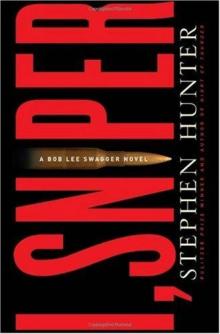 I, Sniper
I, Sniper Havana
Havana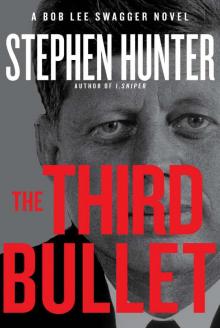 The Third Bullet
The Third Bullet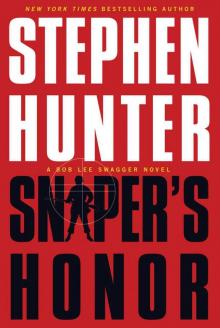 Sniper's Honor: A Bob Lee Swagger Novel
Sniper's Honor: A Bob Lee Swagger Novel Dirty White Boys
Dirty White Boys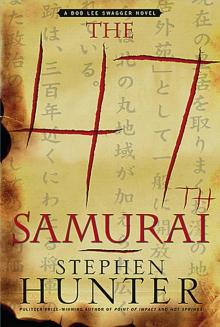 The 47th Samurai
The 47th Samurai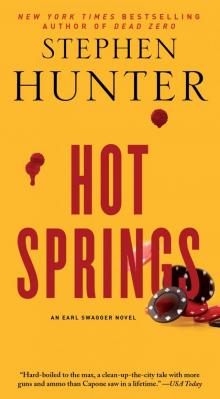 Hot Springs
Hot Springs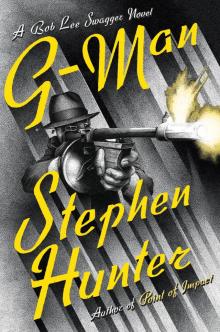 G-Man
G-Man Black Light
Black Light Time to Hunt
Time to Hunt The Day Before Midnight
The Day Before Midnight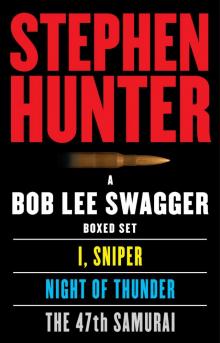 A Bob Lee Swagger Boxed Set
A Bob Lee Swagger Boxed Set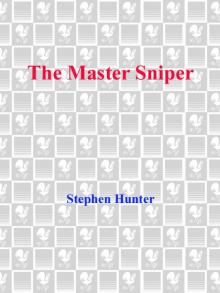 The Master Sniper
The Master Sniper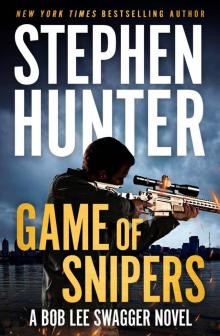 Game of Snipers
Game of Snipers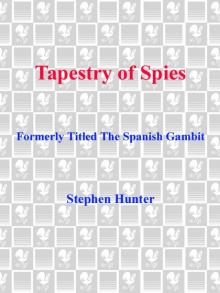 Tapestry of Spies
Tapestry of Spies Citadel
Citadel The Second Saladin
The Second Saladin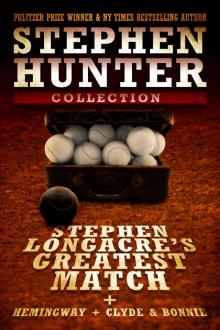 Stephen Longacre's Greatest Match
Stephen Longacre's Greatest Match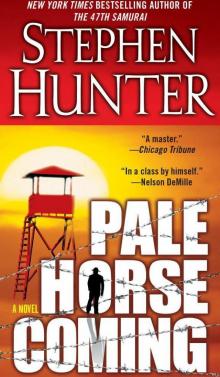 Pale Horse Coming
Pale Horse Coming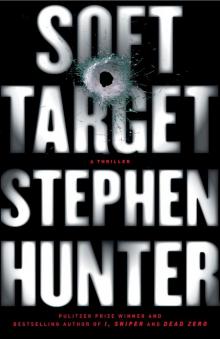 Soft Target
Soft Target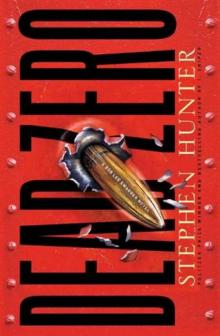 Dead Zero
Dead Zero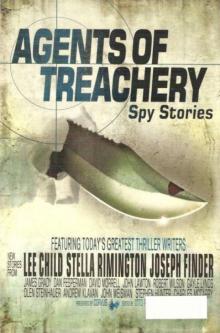 Casey at the Bat
Casey at the Bat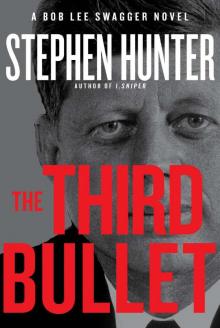 The Third Bullet bls-8
The Third Bullet bls-8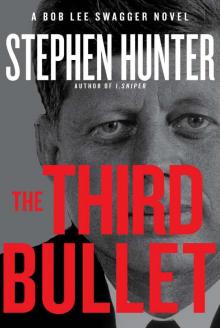 The Third Bullet: A Bob Lee Swagger Novel
The Third Bullet: A Bob Lee Swagger Novel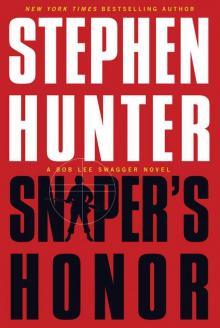 Sniper's Honor
Sniper's Honor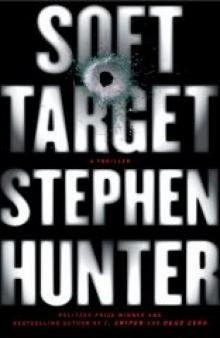 Soft target rc-1
Soft target rc-1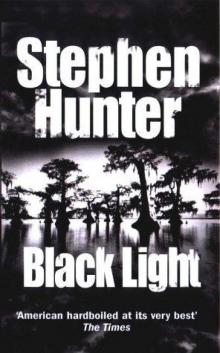 Black Light bls-2
Black Light bls-2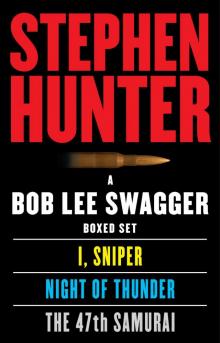 A Bob Lee Swagger eBook Boxed Set: I, Sniper, Night of Thunder, 47th Samurai
A Bob Lee Swagger eBook Boxed Set: I, Sniper, Night of Thunder, 47th Samurai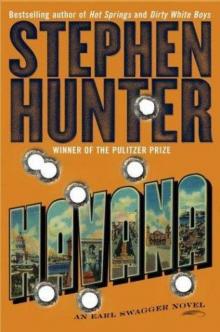 Havana es-3
Havana es-3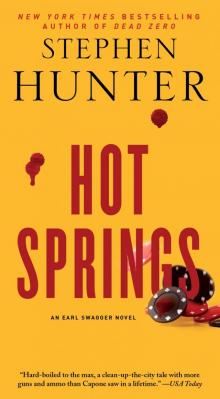 Hot Springs (Earl Swagger)
Hot Springs (Earl Swagger)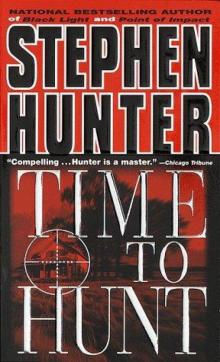 Time to Hunt bls-1
Time to Hunt bls-1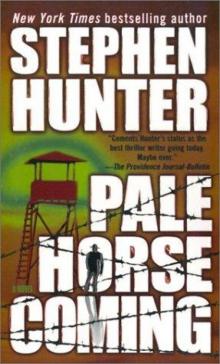 Pale Horse Coming es-2
Pale Horse Coming es-2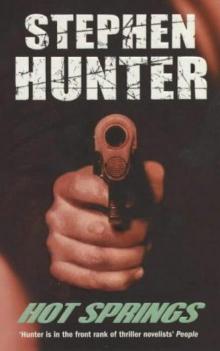 Hot Springs es-1
Hot Springs es-1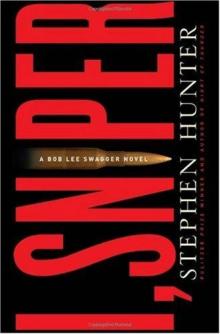 I, Sniper: A Bob Lee Swagger Novel
I, Sniper: A Bob Lee Swagger Novel